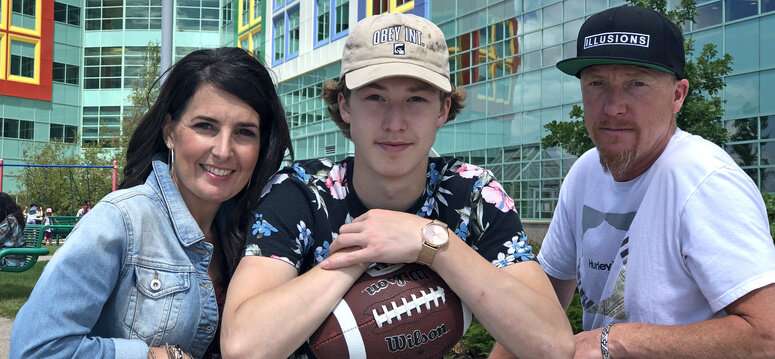Cognitive-behavourial therapy helps teens sleep well after a concussion

When 16-year-old Ethan Ballance became forgetful and unfocused, his mom knew his latest concussion was serious. "Ethan put the cereal box in the fridge and the milk in the cupboard one morning. That's no big deal, but I knew he was getting mixed up a lot," says Cindy Nickerson.
The active, sports-loving teenager has suffered five serious concussions. He fell off an ATV, hit his head in a downhill skiing tumble, hit the pavement while longboarding, and recently suffered a major hit in a high school football game. Ballance went to the Calgary Childhood Complex Concussion Clinic at the Alberta Children's Hospital to get help for his symptoms. The teenager was struggling with light sensitivity, headaches, and forgetfulness. But most of all he was struggling to fall asleep.
"I was just always tired, I couldn't fall asleep until after midnight and forced myself to wake at 7:30 a.m., which meant I was just really tired all day," says the teen. At the clinic, Ballance met Dr. Brian Brooks, Ph.D., a concussion researcher at the Cumming School of Medicine (CSM).
Poor sleep associated with concussion
Brooks is a neuropsychologist who studies how to better diagnose and treat young people with concussion, and better predict recovery. His work with Dr. Lianne Tomfohr-Madsen, Ph.D., a sleep researcher at the CSM, is investigating the role of insomnia in those with poor concussion recovery. For example, they have shown that two-thirds of teens who suffer from persistent post-concussion symptoms complain of serious sleep disruption, identifying that insomnia is one of the most common side-effects of a brain injury.
"These reported sleep disruptions are so serious that they hold kids back from attending class and they interfere with the family life, as parents worry about how to adjust to a teenager who can't fall asleep," says Brooks.
He and Tomfohr-Madsen, along with colleagues at UCalgary, have just completed a pilot study treating kids with insomnia after a concussion. Published in the Journal of Head Trauma Rehabilitation, the study found that cognitive-behavioural therapy was effective in teens with post-concussive symptoms and poor sleep. The therapy is routinely recommended for people with sleep problems. But this is the first time it has been shown to help teens with concussion and insomnia.
"This is very exciting for us, to see kids report improved sleep quality almost immediately. This is important because it is the only evidence-based program that has examined kids with concussion and is shown to dramatically improve their sleep health," says Tomfohr-Madsen, who adapted the cognitive-behavioural therapy protocol for the 24 study participants.
Teens made regular visits to the clinic for one-on-one counselling for six weeks. They learned about healthy sleep habits, including removing digital devices from their bedrooms, keeping a sleep diary, challenging negative thoughts about sleep, and creating a consistent schedule by going to bed and waking around the same time every day.
Teen's recovery gets him back in the game
Although Ballance didn't participate in the study, he is following the new protocol, and is encouraged by his results. The teen is feeling so much better, he's returned to playing football and plans to continue playing when school resumes in the fall. "I was really doing poorly in school because of the lack of sleep, but I'm coming back to normal," he says.
Ballance's dad says he's seen a big change. "Before the therapy he was very irritable, his sleep was very off and on, and you could see it was frustrating him not being able to sleep," says Ryan Ballance. "After the therapy, his mood in the morning improved. He was able to use the tools he learned in therapy to deal with the anxiety he was feeling and prepare for bed, so he could get a good night's sleep."
Ballance's mom is relieved that her son is doing better. "More research in the area of insomnia, and especially concussions, is paramount for young children and adults who suffer, and for their families who support them," says Nickerson. "I fully support more research around this topic—only then can we begin to better prepare our children to be safe out there on the field, court, or ice."
Brooks and Tomfohr-Madsen suggest future research should focus on a larger trial to gather more evidence.
More information: A Pilot Randomized Controlled Trial of Cognitive-Behavioral Therapy for Insomnia in Adolescents With Persistent Postconcussion Symptoms. Journal of Head Trauma Rehabilitation, DOI: 10.1097/HTR.0000000000000504













